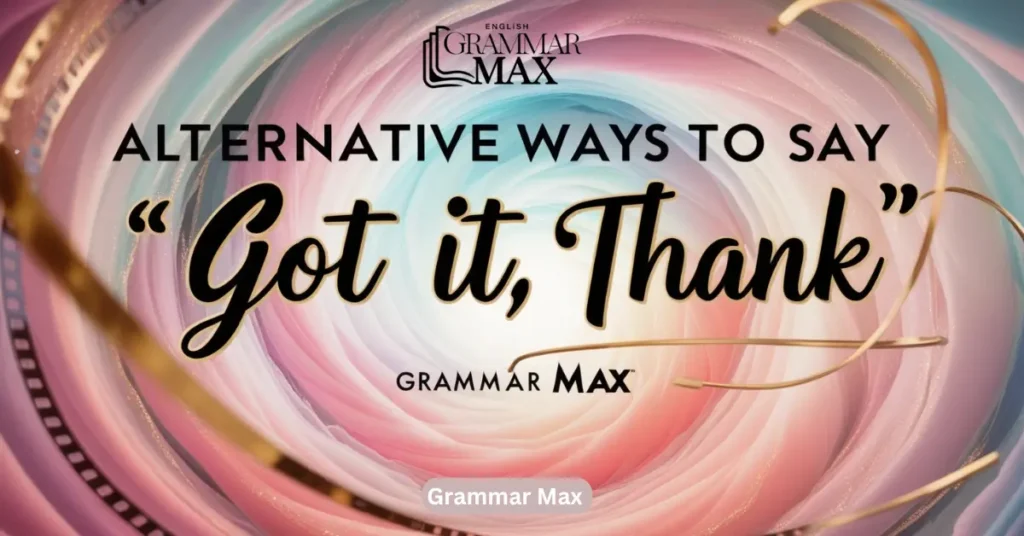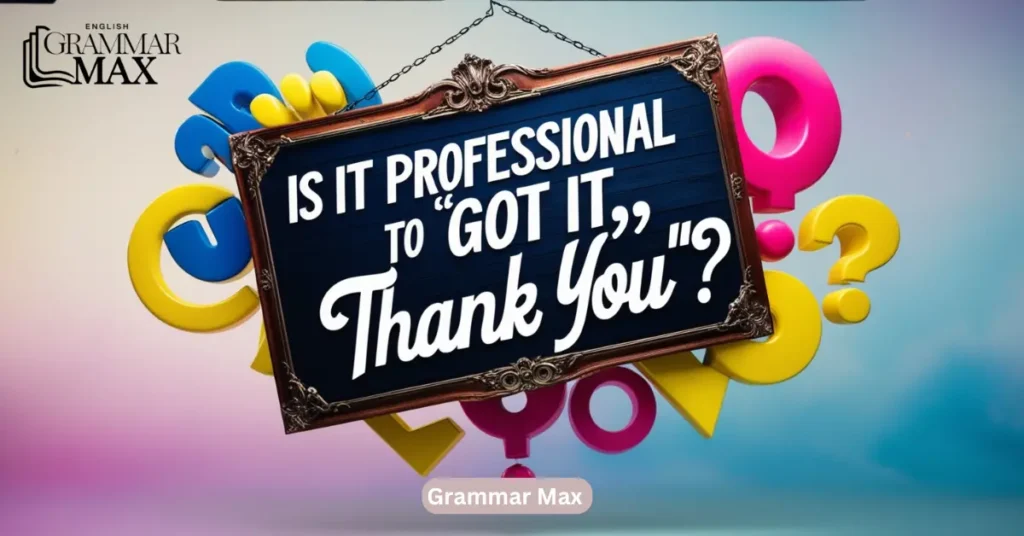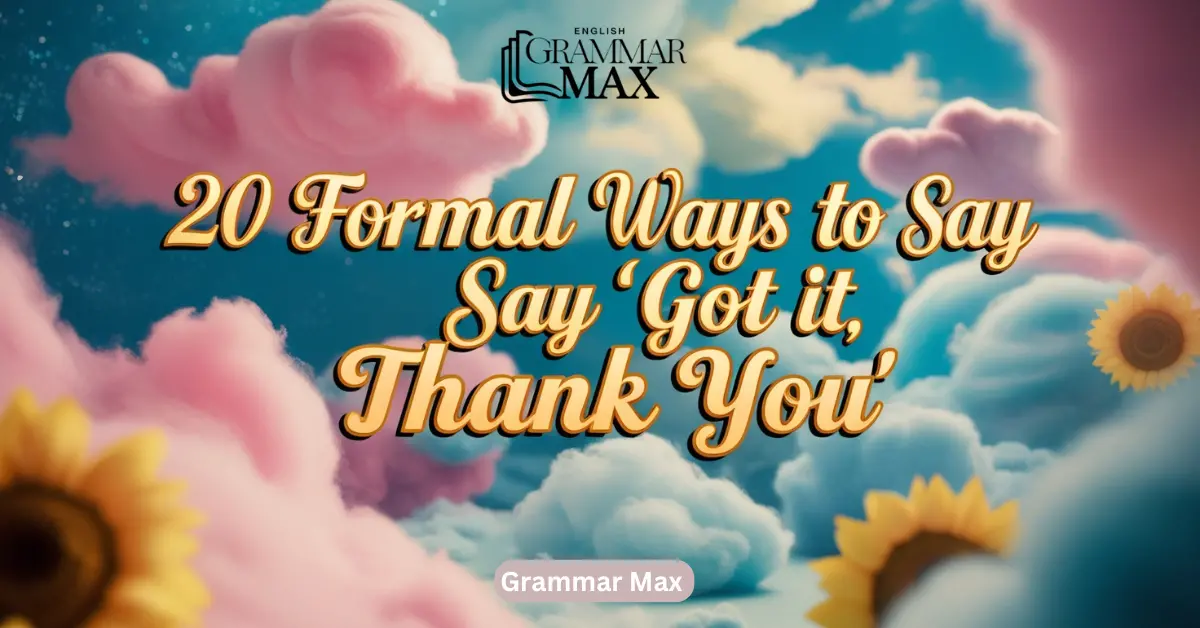“Got it, thank you” is a common phrase in everyday conversations that acknowledges receipt of information. While this phrase works well in casual settings, formal communication such as professional emails and business correspondence often requires more sophisticated alternatives to maintain a polished tone. When responding to updates, clarifications, or instructions, expressing clear understanding and gratitude in a more formal way is essential for creating a positive impression.
In this article, we’ll explore 20 formal phrases you can use instead of “got it, thank you.” These professional terms ensure your responses are appropriate for various workplace communication scenarios.
Alternative Ways to Say “Got It, Thank You”

You can use these phrases to replace “Got It, Thank You”:
- Message Has Been Duly Acknowledged
- Thank You for the Update
- Appreciate the Clarification
- Acknowledged with Thanks
- Noted, Thank You
- Thank You for the Heads Up
- Your Message Has Been Received and Acknowledged
- I Appreciate Your Prompt Response
- Understood, Thank You
- Your Instructions Have Been Noted
- Thank You for the Detailed Explanation
- I Appreciate the Clarification and Guidance
- Thank You for Your Swift Response
- Message Noted, Thank You
- Your Points Have Been Duly Acknowledged
- I Appreciate the Update
- Your Email Has Been Duly Noted
- Grateful for the Clarification
- Thanks, Got It
- Acknowledged, Thank You
This Message Has Been Duly Acknowledged
This formal phrase confirms that the message has been received and understood. It reassures the sender that you take their communication seriously and will act on it as needed. The use of “duly” emphasizes that the acknowledgment is proper and meets expectations. This phrase commonly appears in business or legal contexts where precision matters.
Best Use:
This phrase works well in formal settings to confirm proper receipt of a message. It is ideal for business or legal communications.
I Appreciate the Update
This phrase conveys gratitude for receiving new information or a status change. It shows that you value being kept informed and appreciate the sender’s effort. This expression implies that the update is useful and that you will consider the information.
Example:
“Hi John, I appreciate the update on Phase 2. I look forward to reviewing the detailed report during the meeting. Thanks for keeping us in the loop! Best, Sarah.”
Thank You For The Update
This expression shows appreciation for receiving new or updated information. It reflects that you value staying informed and acknowledges the sender’s effort in sharing the latest developments. In professional settings, using this phrase helps maintain good communication and fosters positive relationships.
Your Email Has Been Duly Noted
This formal response confirms that you have received, understood, and are considering the contents of the email. The word “duly” emphasizes that you properly regard the importance of the communication.
Example:
“Hi John, your email has been duly noted. We’ll prepare the necessary documents for the next steps and await further instructions during the meeting. Regards, Mike.”
Appreciate The Clarification
You use this phrase when someone has provided additional explanation or details to clear up confusion or uncertainty. It expresses gratitude for helping to improve understanding and shows that the clarification was necessary and helpful. This phrase implies that you had some uncertainty before the clarification but now have a clearer picture.
Best Use:
Use this phrase after someone provides additional explanation to resolve confusion, especially in discussions where clarity is vital, such as meetings or email threads.
Example:
“Subject: Re: Clarification on Project Timeline
Hi John, I appreciate the clarification on the project timeline. The updated schedule helps clear up the confusion I had regarding the deadlines. I’ll adjust my tasks accordingly to ensure we stay on track. Thanks again for your help! Best, Sarah.”
Acknowledged with Thanks
This phrase confirms receipt of a message while also expressing gratitude for the information shared. It often appears in business settings to convey that you have received and noted the message for future action or consideration. Including “with thanks” adds a polite tone, showing that you value the information provided.
Best Use:
This phrase works well to confirm receipt of information and show gratitude in professional communication, especially for official instructions or decisions.
Noted, Thank You
This short and direct phrase confirms that you have understood and recorded the information. “Noted” indicates that you have taken the message into account, while “thank you” adds an element of appreciation for the communication. You often use this phrase in business or formal exchanges where brevity is preferred.
This expression assures the sender that you will remember and act on their message if necessary. Despite its brevity, it effectively conveys both acknowledgment and politeness.
Thanks, Got It
This casual and concise way to acknowledge receipt and understanding of a message or instruction shows that you have registered the information and need no further clarification. This phrase typically appears in more informal or friendly communications.
Example:
“Hi John, thanks, got it! I look forward to seeing the detailed report during the meeting. Cheers, Tom.”
Is it Professional to Say “Got It, Thank You”?

Using “got it, thank you” can be professional in certain contexts, depending on the nature of the communication and the relationship between the parties. This phrase is concise and shows that you understand the message while expressing gratitude.
However, in more formal settings or with senior colleagues, you might prefer a more formal response such as “I have received and understood your message, thank you.” Ultimately, “got it, thank you” is appropriate for casual or semi formal exchanges but should be avoided in strictly formal situations.
Frequently Asked Questions
What does “got it, thanks” mean?
“Got it, thanks” means that the speaker has understood the information provided and expresses gratitude. It signifies acknowledgment and appreciation concisely.
Is it okay to say “got it, thanks”?
Yes, it is generally acceptable to say “got it, thanks” in casual or semi-formal settings. However, in more formal contexts, a more polished response may be better.
How do you politely say “got it”?
A polite alternative to “got it” could be “I understand, thank you” or “I appreciate the clarification.” These options convey acknowledgment while maintaining a respectful tone.
Is saying “got it” professional?
Saying “got it” can be seen as informal, making it more suitable for casual conversations. In professional settings, especially with senior colleagues, a more formal acknowledgment may be preferred.
Conclusion
Mastering formal alternatives to casual phrases like “got it, thank you” enhances your communication and ensures professionalism in every interaction. Whether acknowledging instructions, thanking someone for an update, or confirming your clear understanding, using the right phrases in professional emails can elevate the tone of your messages.
Choosing your words carefully can not only prevent ambiguity but also promote full comprehension in workplace communication. Moreover, by incorporating these formal phrases into your daily business emails, you can ensure that your formal communication remains respectful, clear, and professional. In addition, this practice helps you maintain a polished tone in all your interactions. Ultimately, using precise language leads to more effective collaboration and understanding.

William Henry is a writer for Grammar Max, a blog that focuses on synonyms and phrases. He loves exploring the quirks of the English language and enjoys helping readers improve their vocabulary. William’s articles are easy to read, fun, and full of useful tips for anyone looking to better understand and use English. Whether you’re a student, a professional, or just someone interested in language, William’s writing on Grammar Max makes learning about words and their meanings simple and enjoyable.
